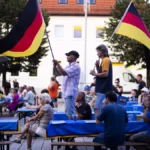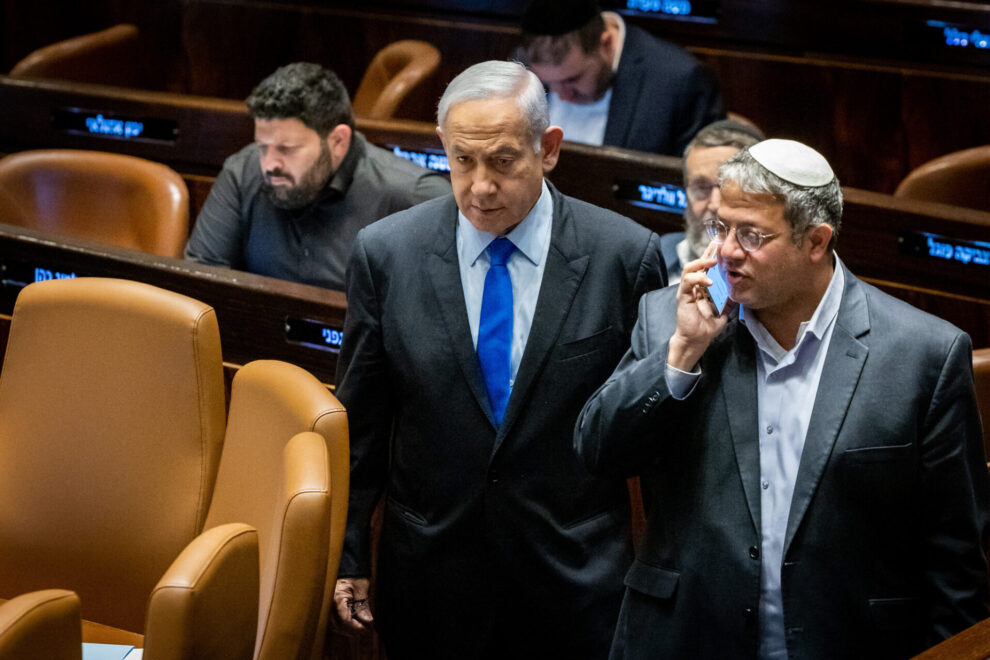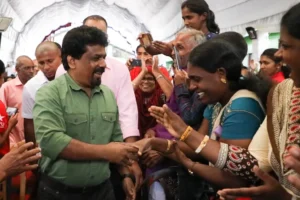Angry response comes after far-right Otzma Yehudit announces boycott of Knesset votes to protest ‘feeble’ reaction to Gaza rockets; party leader Ben Gvir challenges PM to fire him
The ruling Likud party on Wednesday slammed National Security Minister Itamar Ben Gvir for his far-right party’s decision to boycott Knesset votes, telling him if he did not like the way Prime Minister Benjamin Netanyahu runs the government he could leave.
Firing back, Ben Gvir said Otzma Yehudit would continue to refrain from voting with the coalition until Netanyahu adopted more hardline policies, and fumed over his exclusion from security deliberations on Tuesday’s fighting between Israel and Gaza-based terror groups.
The exchange of verbal hostilities came after Otzma Yehudit announced it would skip votes at the Knesset throughout the day, citing the government’s “feeble” response to the rocket fire from Gaza. Ben Gvir and other members of the ultra-nationalist party instead decamped to the southern city of Sderot, where three foreign nationals were wounded in a rocket attack Tuesday.
“The prime minister, defense minister, the IDF and security agencies are the ones who handle the sensitive and complex security incidents that Israel is dealing with,” Likud declared in a statement.
“The prime minister is the one who decides who is a relevant participant in the discussions. If this is unacceptable to Minister Ben Gvir he does not have to remain in the government,” it added.
The dust-up was the latest in a series of fissures to emerge in Netanyahu’s hardline right-religious government, which has faced mounting internal pressure over its currently shelved plans to overhaul the judiciary, along with the skyrocketing cost of living, burgeoning violent crime and deepening conflict with the Palestinians.
In his response to Netanyahu, Ben Gvir cited what his party described as the weak military response to the rocket attacks from Gaza, but also pointed to the failure to pass judicial reforms and to demolish the illegal Palestinian Bedouin encampment of Khan al-Ahmar.
“If you don’t want Otzma Yehudit in the government you are welcome to fire us. If you don’t want a real right-wing government you are welcome to send us home,” Ben Gvir told Netanyahu from a private home in Sderot.
“I am giving notice here that we, Otzma Yehudit, will not be present for votes in the Knesset until the prime minister understands and internalizes that the goal of this government is to be a real right-wing government,” he continued.
Ben Gvir also insisted that he be included in security deliberations, such as those regarding the response to the Gaza rocket fire, though such matters do not fall under the purview of his ministry.
“I am saying as explicitly as possible: If he wants us in the government he needs to invite us to these deliberations — and not as it has happened in the last four months, when the decisions have already been made,” said Ben Gvir.
“If we are partners then we need to be invited and, more importantly, have influence. If the prime minister wants that, we will be happy. If not, we will not come to votes.”
He did not stipulate, however, precisely what terms needed to be fulfilled in order for his party to resume showing up to Knesset votes.
The move came as Ben Gvir faces increased pressure over rising terror attacks and a sharp jump in murders since he came into office in December after running on a platform of keeping citizens safer.
Associates of Netanyahu slammed Ben Gvir to the Kan public broadcaster, accusing him of raising fresh demands after the premier recently agreed to back the formation of a National Guard in exchange for the Otzma Yehudit chief agreeing to back a pause on the judicial overhaul.
“You can’t give a political bribe every time to soothe Ben Gvir,” the unnamed sources were quoted as saying.
Netanyahu and Ben Gvir were also at odds over the latter’s attempt to block Palestinian security prisoners from using cellphones, with Hebrew media reports saying the premier interfered by reaching out to the Israel Prisons Service without his knowledge to ask the move be blocked.
Responding to the reports, the prisons service said its chief, Katy Perry, did not speak with Netanyahu.
Finance Minister Bezalel Smotrich later tried to smooth over tensions between Netanyahu and Ben Gvir, saying that if the government falls it will be a prize for the terrorists.
“Friends and partners in the government and coalition, let’s calm down,” Smotrich said in a video posted to social media.
“It is possible and necessary to hold internal talks and arguments and there is a lot to improve,” he said, calling on Netanyahu to meet with them as soon as Wednesday for deliberations.
“But we have to keep the government unified and not give a prize to terror and bring back the left, with their terror supporters, to rule,” Smotrich continued. “We have four years to fix and improve through hard work together.”
Opposition National Unity party leader Gantz, meanwhile, said Netanyahu’s squabble with Ben Gvir showed the prime minister could not control his own government.
“Today I visited a kindergarten in Nir Am,” Gantz told Channel 12 news, referring to a kibbutz near Gaza. “While the children go in and out of shelters, the government is behaving like kindergartners.”
Hours before the Otzma Yehudit announcement, Israel and the Gaza terror groups agreed to a ceasefire, Al Jazeera and Reuters reported, after a daylong flare-up in violence sparked by the death of prominent Palestinian Islamic Jihad member Khader Adnan while on a hunger strike in an Israeli prison.
The government came under intense pressure throughout Tuesday to respond forcefully to the rocket attacks, with many of those demands coming from within Netanyahu’s coalition. According to the Israel Defense Forces, Palestinian terrorists launched 104 projectiles from Gaza, including one that hit a construction site in Sderot where the three people were wounded — one moderately and two lightly.
Eventually responding to the rocket attacks from Gaza, the IDF struck 16 targets belonging to Islamic Jihad and Hamas terror groups across the Strip overnight. These included a Hamas training camp; another base that housed a weapons production site, a concrete production plant, and a training site; a site belonging to the Hamas naval commandos; and a tunnel used by Hamas in southern Gaza.
The Hamas-run health ministry in Gaza said a 58-year-old man was killed, and five other civilians were wounded as a result of one of the Israeli strikes near Gaza City.
Source: Times of Israel
















